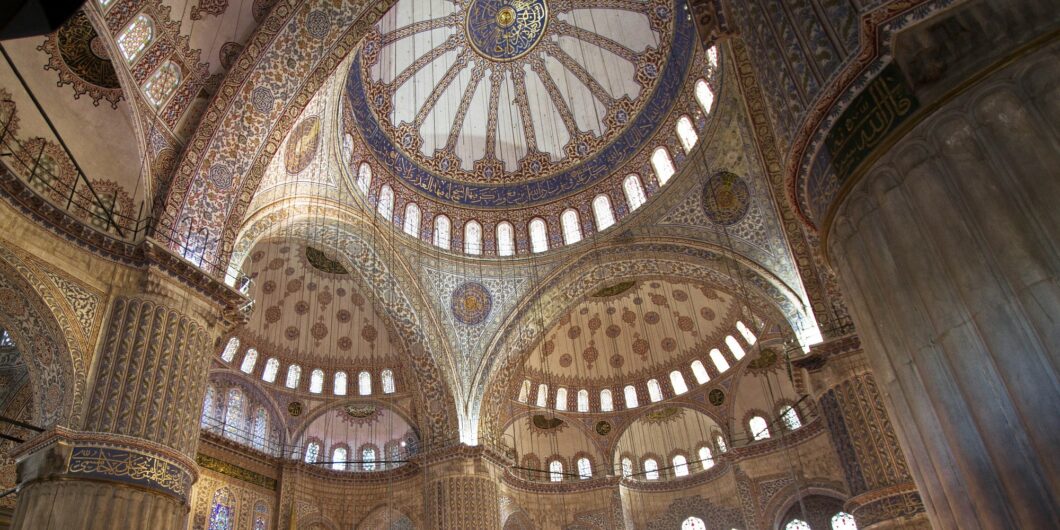Neither religious conservatism nor liberalism should be discarded.
Puncturing the "Violent Islam" Trope
For those who have had personal or professional involvement with Islam and the Islamic world, one of the chief blessings of the end of the War on Terror was the hope that tropes like “Islam is a violent religion” would finally fall by the wayside. David Goldman’s recent Law & Liberty essay, “Is Islam a Violent Religion?” shows that it is not to be.
That myth of an inherently violent Islam, as erroneous as it is, seems to have an irresistible attraction to our national narratives, being particularly alluring because of the overwhelming presence of Islamic terror in our national stories and (one can’t deny it) our experience of the last two decades. This easy but fallacious narrative has progressed from al-Qaeda to ISIS and now to Hamas. Always Islamic groups come to the fore of violence. What more proof does one need of Islam’s intrinsic errors?
The superficial focus on violence has led many to “dig deeper,” often cross-referencing other pundits to confirm the intrinsic violent nature of Islam. These conversations rely on secondary sources in English or other European languages. Rarely do they deal with the real matter, the real texts, the real thought, or the real people who make up the vast and nuanced cosmos of Islamicate society.
Once we dig beyond the superficial, however, we quickly see the error in these arguments. Discussions of Islam’s supposed inherent violence often take the easy route, simply asserting, tout court, that most acts of violence committed in the name of religion are done for the sake of Islam without much to contextualize the statements. Do we mean today? Last week? Last year? Last decade? Last century? Who knows. All we know is that Islam is powerfully violent as a self-asserting tautology.
It’s true that over the last twenty years, those committing religious violence seem overwhelmingly Muslim. That may be true or it may be media bias. I find it confounding how one could quantify something as amorphous as violence well enough to count it, or how one could know another human heart well enough to detect its motivations for action. But even if we accept the premise that Islam is more violent today, it doesn’t follow that Islam is inherently violent always.
Let’s contextualize our focus by shifting to European history and see if we can’t prove the obvious falsity that Christianity is a religion of violence to see through the canard. And we can do so easily, even without invoking the well-trodden history of the Crusades.
If we transported ourselves to the European Wars of Religion where Protestant and Catholic were more than happy to murder each other in a continually increasing series of horrors, be it on the battlefield or in the streets of major European capitals, one could imagine the comparatively pacific Islamicate world looking on in shock at the barbaric world of Christianity. Surely to them, Christianity would have seemed a religion of violence (and the Ottoman Sultan sought to save Christianity from itself by invading Austria in the seventeenth century). Now imagine they had social media apps continually cycling images of this European violence in front of their eyes every day.
Likewise, if the Islamicate or Jewish world were aware of the Spanish activities in the Conquest of the New World, they could prevaricate the issue by shifting focus away from those parts of the Catholic Church that attempted to recognize and protect the humanity of Amer-Indians to those parts of the church that aided and abetted their enslavement to show Christianity beyond redemption.
To reinforce this impression, our hypothetical Islamic and Jewish observers could construct flawed narratives about Christian theology to show its serious errors: Christianity denigrates, even insults, Divine Law, and by so doing grants unlimited license to the wills and desires of its followers. Because of the joyful abandonment of legal restraint, the Muslim line might go, individual Christians are incapable of the serious, refined casuistic legal debate that Muslims and Jews engage in to resolve their religious difference.
What might one expect from polytheistic believers who worship a human being—a man who, far from unifying human difference into a perfect ummah, sought to set brother against brother and fathers against their children, to bring a sword to those relations and despised civil authorities.
What about this death cult, part of which demands that its worshipers engage in the cannibalistic consumption of their idol, a person who breaks the traditional Abrahamic rule of monotheism by claiming implausibly that God is three people in one? Not only do Christians seem to have no respect for human life, but they cannot even understand divine simplicity!
Surely Christianity is a religion of violence with no roots in decent Abrahamic traditions.
While Europe was in its decline after the Barbarian conquests of Rome, Islamicate civilization flourished with a richness rarely known before the modern world.
Or so goes the polemic that seeks to show, against all facts and context, that Christianity is an evil religion of violence bent upon the destruction of the good and decent.
The primary difference between the above narrative and our view of Islam today is both personal position and time. For a Muslim in the Ottoman Empire of the sixteenth and seventeenth centuries, the above description of Christianity might seem all too accurate, but examining the facts outside of their narrow contextualization and bias discloses a deeper and more accurate truth about the virtue and value of Christianity and its charitable, humane nature.
While Islam has certainly had moments of violence, it has had many more of deep humanity. These points have been made in many places, and often in a way that attacks Christianity with similar cheapness to attacks against Islam, but they are nonetheless true.
While Europe was in its decline after the Barbarian conquests of Rome, Islamicate civilization flourished with a richness rarely known before the modern world. While its religion could be dogmatic, this dogmatism tended to be exceptional and many prominent individuals in the Islamicate world were at best heterodox Muslims, demonstrating if not a modern tolerance to religious pluralism and secularism, at least a breadth of mind that moved well beyond the narrow confines of mind assumed by modern critics of the faith.
This period also developed some of Islam’s deepest intellectual traditions, which form the basis of Islamic theology today. These schools of thought are like any other deep and sophisticated tradition: when viewed from a superficial and tendentious direction, they appear simplistic prevarications of the truth, but when engaged with seriousness and discretion, they disclose depth and perspicacity.
One famous pin-cushion is Al-Ghazali, the arch-deacon of Islam’s assumed theological ignorance. Contrary to the alleged absurdity, Al-Ghazali’s thought is not at all dissimilar from Christian theology, especially that of Aquinas. Al-Ghazali’s view of causation, which is the butt of Goldman’s guffaw, actually coincides well (though certainly isn’t identical) with Aquinas’s (and other medieval Christian thinkers) arguments on the same. Both see God’s rationality as unconstrained in the way human reason is. It is therefore only partly discernable to us.
The alleged irrationality of Al-Ghazali’s discussion of causation is therefore only a reflection of a great mind struggling to develop a model giving full scope to both divine and human reason despite acknowledging the latter’s limited ability to grasp the former. If Al-Ghazali and Aquinas navigate this tension differently, theirs is a distinction of emphasis rather than kind.
Much of our perception of the world derives from perspective. We’re bound not just by our individual experience, but also by the perspective of our times. Education and learning are primary ways by which we can transcend the limits of our peculiar places in the world. In order to benefit maximally from such learning, however, we must engage it from a dispassionate position taking all factors into account with an awareness that just because things are so now doesn’t mean they were or will be so.
This final point is where many pundits on Islam err. Instead of considering the facts holistically, they take second-hand, often biased information, analyzing while assuming that our narrow context of experience is universal.
It’s easy to call Islam a religion of violence if one looks only at our own day and examines Islam only from the Western, largely Christian/Jewish perspective. If we tackle the subject with more honesty and depth, however, these misconceptions can’t help but fall away. Violence and one’s propensity to it is more often itself a factor of these perspectives (i.e. the biases of the committers of violent acts) than a pre-ordained phenomenon based on one’s religious or other beliefs, which is subject to an infinite multitude of both minute and capacious variation. We are our own people, bound and built by our contexts, but empowered by our will.



